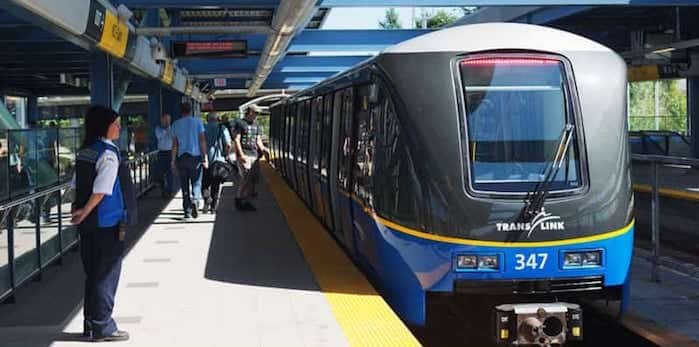“Next stop: University of British Columbia.”
Although it may still be years before you hear those words announced over the SkyTrain intercom, last week our region took a significant step towards making the Millennium Line extension to UBC a reality.
 TransLink
TransLink
During their January 24 meeting, the Mayors’ Council on Regional Transportation voted unanimously in favour of considering the SkyTrain extension to UBC, after receiving a report from TransLink endorsing SkyTrain as the best transit option to service the university’s campus and bustling Broadway corridor.
At the Greater Â鶹´«Ă˝Ół»Board of Trade, our organization has long supported a SkyTrain extension to UBC, because we firmly believe it is the best long-term option for our rapidly growing region. Given that another one million people are expected to move to the Lower Mainland over the next two decades, our roadways and existing transit infrastructure will soon see more demand than ever before.
The report prepared by TransLink staff validates our thinking and recommends SkyTrain as the best of the options before us. The report notes that other transit modes – such as light rail (LRT) and additional bus services – would likely be over capacity within the next 15 years. That is simply not good enough.
To meet the transit and transportation challenges of the future, we need to think big. That is one of the reasons that our organization took a lead role in advocating for a Yes vote in the 2015 transit referendum – because we feel strongly that bold action is needed today to prepare for our region’s mobility challenges of tomorrow.
It was that same degree of foresight that also motivated the Board of Trade to form a coalition in 2004, which successfully advocated for a re-vote by the TransLink board to save the Richmond-Airport-Â鶹´«Ă˝Ół»rapid transit line. Today, the “RAV” line is known as the Canada Line, and it is considered an integral part of our region’s transportation network. What’s more, the Canada Line has consistently exceeded ridership targets since the day it opened, which reinforces the need to be ambitious in our future transit planning.
Why does this issue matter so much to a business organization such as ours? Because the evidence is clear. Traffic congestion harms not only the quality of life of residents but also our environment and our economy. Studies estimate that here in the Lower Mainland, congestion costs our regional economy upwards of $1.4 billion every year – and counting.
In the Greater Â鶹´«Ă˝Ół»Economic Scorecard 2018, our region scored a “C” grade in non-car commuting and a “D” grade in public transit railway network length, when compared against 19 other metropolitan regions around the world. In other words, there is ample room for improvement.
In a recent survey, the Millennium Line extension ranked as one of the top public policy priorities of Greater Â鶹´«Ă˝Ół»Board of Trade members. We believe this reflects the fact that many of our members and their businesses would benefit from rapid transit that connects the Broadway corridor, where many offices are now located, to the communities of Burnaby, Coquitlam, and Port Moody, where many of those employees live and raise their families.
We were very encouraged to see our region’s mayors vote unanimously in favour of exploring this exciting long-term project because it demonstrates a shared understanding among elected officials that the communities in our region are interconnected. We hope to see the City of Â鶹´«Ă˝Ół»council also affirm their support at their upcoming meeting this week.
For 131 years, the Greater Â鶹´«Ă˝Ół»Board of Trade has helped to lead and guide region-defining conversations just like this one. We look forward to collaborating with TransLink, governments, and stakeholders across the region to help increase mobility, improve quality of life and build a world-class transit network that will meet the needs of our community for decades to come.
Iain Black is president and CEO of the Greater Â鶹´«Ă˝Ół»Board of Trade.


.jpg;w=120;h=80;mode=crop)